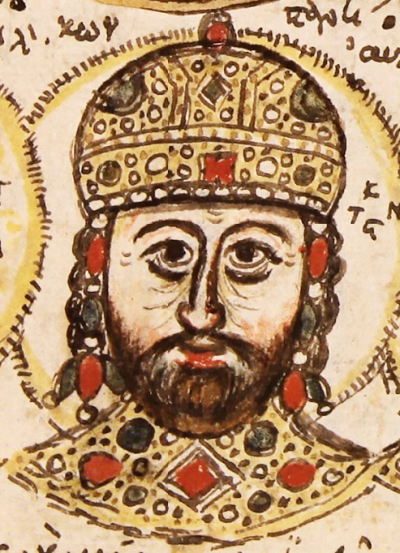Heraclius (Greek: , translit. Hrkleios; c. 575 11 February 641), sometimes called Heraclius I, was Eastern Roman emperor from 610 to 641. His rise to power began in 608, when he and his father, Heraclius the Elder, the exarch of Africa, led a revolt against the unpopular usurper Phocas.
Heraclius's reign was marked by several military campaigns. The year Heraclius came to power, the empire was threatened on multiple frontiers. Heraclius immediately took charge of the ByzantineSasanian War of 602628. The first battles of the campaign ended in defeat for the Byzantines; the Persian army fought their way to the Bosphorus but Constantinople was protected by impenetrable walls and a strong navy, and Heraclius was able to avoid total defeat. Soon after, he initiated reforms to rebuild and strengthen the military. Heraclius drove the Persians out of Asia Minor and pushed deep into their territory, defeating them decisively in 627 at the Battle of Nineveh. The Persian king Khosrow II was overthrown and executed by his son Kavad II, who soon sued for a peace treaty, agreeing to withdraw from all occupied territory. This way peaceful relations were restored to the two deeply strained empires.
However, Heraclius soon lost many of his newly regained lands to the Rashidun Caliphate. Emerging from the Arabian Peninsula, the Muslims quickly conquered the Sasanian Empire. In 636, the Muslims marched into Roman Syria, defeating Heraclius's brother Theodore. Within a short period of time, the Arabs conquered Mesopotamia, Armenia and Egypt. Heraclius responded with reforms which allowed his successors to combat the Arabs and avoid total destruction.
Heraclius entered diplomatic relations with the Croats and Serbs in the Balkans. He tried to repair the schism in the Christian church in regard to the Monophysites, by promoting a compromise doctrine called Monothelitism. The Church of the East (commonly called Nestorian) was also involved in the process. Eventually this project of unity was rejected by all sides of the dispute.
This is a list of the Byzantine emperors from the foundation of Constantinople in 330 AD, which marks the conventional start of the Byzantine Empire (or the Eastern Roman Empire), to its fall to the Ottoman Empire in 1453 AD. Only the emperors who were recognized as legitimate rulers and exercised sovereign authority are included, to the exclusion of junior co-emperors (symbasileis) who never attained the status of sole or senior ruler, as well as of the various usurpers or rebels who claimed the imperial title.
The following list starts with Constantine the Great, the first Christian emperor, who rebuilt the city of Byzantium as an imperial capital, Constantinople, and who was regarded by the later emperors as the model ruler. It was under Constantine that the major characteristics of what is considered the Byzantine state emerged: a Roman polity centered at Constantinople and culturally dominated by the Greek East, with Christianity as the state religion.
The Byzantine Empire was the direct legal continuation of the eastern half of the Roman Empire following the division of the Roman Empire in 395. Emperors listed below up to Theodosius I in 395 were sole or joint rulers of the entire Roman Empire. The Western Roman Empire continued until 476. Byzantine emperors considered themselves to be rightful Roman emperors in direct succession from Augustus; the term "Byzantine" was coined by Western historiography only in the 16th century. The use of the title "Roman Emperor" by those ruling from Constantinople was not contested until after the Papal coronation of the Frankish Charlemagne as Holy Roman Emperor (25 December 800), done partly in response to the Byzantine coronation of Empress Irene, whose claim, as a woman, was not recognized by Pope Leo III.
In practice, according to the Hellenistic political system, the Byzantine emperor had been given total power through God to shape the state and its subjects, he was the last authority and legislator of the empire and all his work was in imitation of the sacred kingdom of God, also according to the Christian principles,he was the ultimate benefecator and protector of his people.

 English
English  español
español  français
français  português
português  русский
русский  العربية
العربية  简体中文
简体中文 
